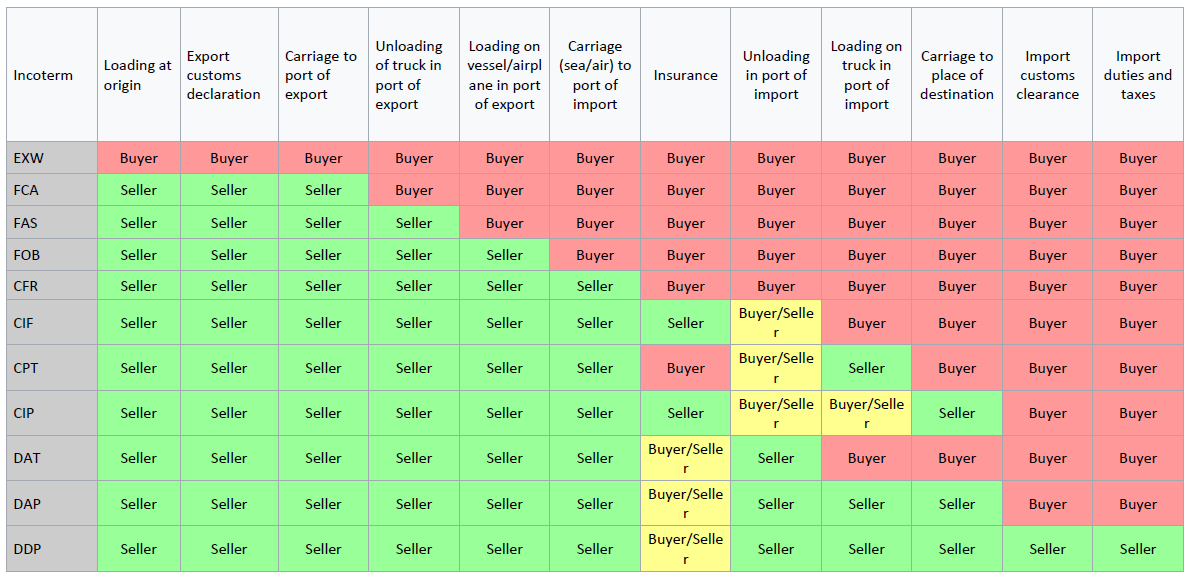Responsibilities of buyer and seller in Incoterms
By 7Plus-Kelly
June 2nd, 2023
Today I will introduce you to international trade terms, as well as the most commonly used trade terms in our stores and offline transactions.
The general trade terms are EXW, FCA, FAS, FOB, CFR, CIF, CPT, DAT, DAP, DDP.
EXW: The abbreviation of "EX Works". This means that the seller is responsible for fulfilling his delivery obligation by placing the goods at the buyer's disposal at his premises (factory, workshop, warehouse, etc.). It is generally used by customers who have a fixed freight forwarder in the buyer's country.
FCA: the abbreviation of "Free Carrier". Using this term, the seller is responsible for handling the customs clearance of the goods for export, handing over the goods to the carrier designated by the buyer at the time and place agreed in the contract, and notifying the buyer in time.
FAS: The abbreviation of "Free Alongside Ship". Using this term, the seller is responsible for placing the goods on a dock or barge close to the ship at the port of shipment, i.e. making delivery.
FOB: It is the abbreviation of Free on Board or Freight on Board. Using this term, the seller shall be responsible for handling export declaration procedures, deliver the goods to the ship designated by the buyer at the port of shipment and within the specified time limit specified in the contract, bear all risks before the goods pass the ship's rail at the port of shipment, and notify the buyer in time. The risk passes to the buyer after the goods are loaded on board at the port of shipment. It is one of the more commonly used foreign trade terms.
CFR: the abbreviation of "Cost and Freight". The seller is responsible for chartering the ship and booking space according to the usual conditions and paying the freight to the port of destination, loading the goods on the ship according to the port of shipment and shipping period stipulated in the contract, and notifying the buyer in time.
CIF: the abbreviation of "Cost Insurance and Freight". Using this term, the seller is responsible for chartering the ship and booking space under the usual conditions and paying the freight to the port of destination, loading the goods on board the ship within the port of shipment and shipment period stipulated in the contract, and taking care of the cargo transportation insurance and paying the insurance premium.
CPT: The English abbreviation of "Carriage Paid to". Using this term, the seller shall contract for carriage and pay for the carriage of the goods to their destination at their own expense. After going through customs clearance procedures for the export of goods, hand over the goods to the carrier at the agreed time and designated place of shipment, and notify the buyer in time.
DAT: Delivered At Terminal (insert named terminal port or place of destination) . This term is used when the seller delivers the goods to the port or terminal of destination specified in the contract on the date or within the period agreed in the contract, and unloads the goods from the arriving loaded conveyance and places them at the disposal of the buyer. goods.
DAP: "Delivered At Place" (insertnamed place of destination). To use this term, the seller must enter into a contract of carriage and pay for the carriage of the goods to the named destination or to an agreed point within the named destination; at the named destination the goods in conformity with the contract are placed on the arrived means of transport Delivery is complete when it is placed at the Buyer's disposal.
DDP: "Delivered Duty Paid" (named place of destination). DDP means that the seller completes the import customs clearance procedures at the designated destination, and hands over the goods that have not been unloaded on the delivery vehicle to the buyer to complete the delivery. The seller must bear all risks and costs of transporting the goods to the named destination, including any "taxes" payable at the destination when customs formalities are required (including the responsibility and risk of customs formalities, and the payment of handling charges, duties, taxes and other charges). This is the most commonly used trade term for bulk cargo (when customers buy in small quantities).
It is also the most commonly used trade term in our shop.
The buyer under the EXW term bears the greatest responsibility, while the seller under the DDP term bears the greatest responsibility. This term should not be used if the seller cannot directly or indirectly obtain an import license.
The figure below clearly shows the scope of responsibility of the buyer and the seller.

Previous
Returns, Refunds and Shipping Policy
Read More
Next
Introduce us to everyone-Professional electric vehicle manufacturer
Read More

